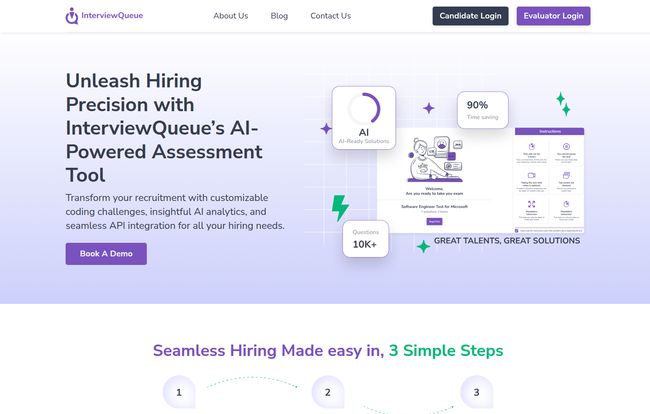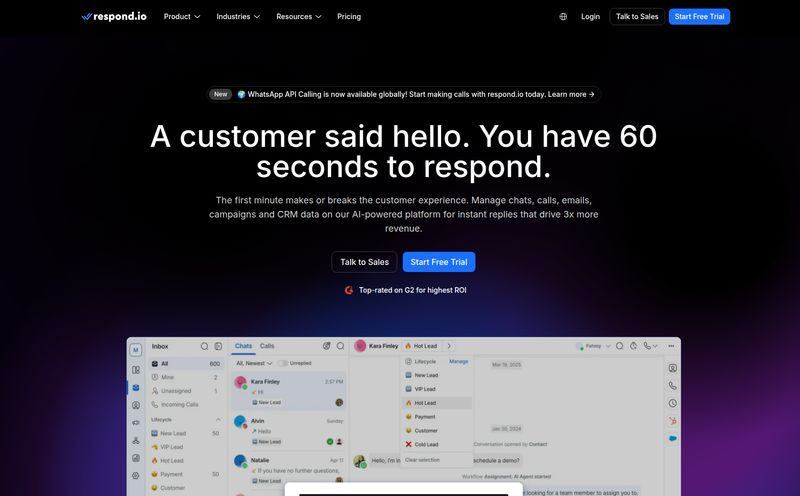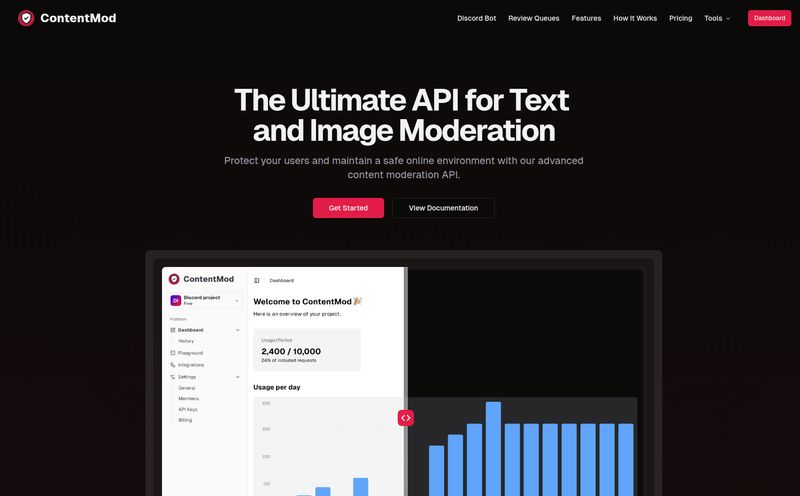If you’ve ever been on the hiring side of the table, you know the grind. It's a soul-sucking, time-consuming vortex of resumes, half-baked cover letters, and those awkward first-round calls that feel more like a dental appointment. For every gem you find, you have to pan through a river of silt. I’ve spent more hours than I care to admit staring at a screen, my eyes glazing over, trying to decide if “proficient in Microsoft Office” is a skill or just a given in 2024.
So, whenever a new tool pops up promising to “revolutionize recruitment” with AI, my inner cynic and my exhausted inner hiring manager both perk up. The latest one to cross my desk is InterviewQueue. It touts AI-powered assessments, ChatGPT integration, and a whole suite of features designed to take the grunt work out of screening. But does it deliver, or is it just more tech-bro jargon wrapped in a pretty UI?
I decided to take a closer look.
So, What's the Big Deal with InterviewQueue?
At its core, InterviewQueue is an online assessment platform. Think of it as a super-smart, ruthlessly efficient bouncer for your hiring funnel. Its main job is to handle the initial screening process, giving your candidates a standardized, relevant set of challenges to tackle before they ever get to a human conversation. The goal is to weed out the folks who just aren’t a fit and bubble up the ones who have the actual skills you’re looking for.
It’s not just about asking multiple-choice questions. The platform leans heavily on custom tests, especially for technical roles, and uses AI to help evaluate the results. The promise is simple: less time spent on unqualified candidates, more time spent with your actual top contenders. It’s a move away from that classic “gut feeling” hiring and toward something a bit more… scientific.
<
Visit InterviewQueue
The Features That Actually Make a Difference
A features list is just a list until you see how it solves a real problem. Here’s what stood out to me in InterviewQueue’s toolkit.
Custom Assessments Built for Your Role (with a little ChatGPT magic)
Generic skills tests are the worst. They’re boring for the candidate and rarely tell you what you actually need to know. InterviewQueue's biggest strength, in my opinion, is the ability to create custom assessments. If you’re hiring a Python developer, you can give them a real, relevant coding challenge. This is huge.
And here’s the clever part: they’ve integrated ChatGPT. Let’s say you’re a hiring manager, not a senior developer. You might not know how to craft the perfect coding problem. With this integration, you can describe the role and the skills you need, and it helps you generate a suitable assessment. It’s a smart shortcut that lowers the barrier to creating high-quality, specific tests.
<The AI Brains Behind the Curtain
This is where the AI buzzword gets real. InterviewQueue uses AI in a couple of ways. First, there’s the AI-powered evaluation. For things like coding tests, it can automatically check for functionality, efficiency, and adherence to best practices. This provides a first-pass objective score, removing the initial human bias from the equation. Someone’s code either works or it doesn’t.
Second, they have a proctoring system. With remote hiring, you always have that nagging worry: is the person taking the test the actual candidate? The proctoring system helps monitor for any funny business, ensuring the results you’re seeing are legitimate. It’s a necessary evil in the world of online assessments.
Moving from Gut Feelings to Hard Data with Analytics
I’ve always been a data guy. In SEO, if you can’t measure it, it doesn’t exist. I've always felt hiring should be the same. InterviewQueue provides a comprehensive analytics dashboard that lets you see how candidates are performing at a glance. You can compare applicants against each other using the same standardized criteria, see where people struggled, and identify trends.
This is how you move from saying “I have a good feeling about this one” to “This candidate scored in the top 10% on the core competency test and finished 20% faster than the average.” One is a gamble; the other is an informed decision.
The Good, The Bad, and The AI Reality
No tool is perfect. Let’s get into the nitty-gritty. After digging around, the benefits are pretty clear. You get a much more streamlined hiring process. The efficiency gain is undeniable—automating that first screening step frees up countless hours. The assessments are objective and standardized, which is a massive step toward fairer hiring and helps with those DEI initiatives everyone is talking about. And the ability to customize tests and integrate everything with your existing systems via API is just solid, practical design.
But let’s be real, there are some trade-offs. Relying heavily on an AI to do the initial screen means you might miss some nuance. What about the brilliant developer who’s just bad at timed tests? Or the candidate with a slightly unconventional solution that the AI marks down, but a human would see as innovative? You risk filtering out quirky geniuses if you treat teh AI's score as absolute gospel. It's a tool for assistance, not a replacement for human insight.
Also, like any powerful software, there’s going to be a learning curve. You have to invest time upfront to configure your assessments and integrate the platform. It's not a plug-and-play solution you can master in an afternoon. You get out what you put in.
<What About the Price Tag? The Great InterviewQueue Mystery
Okay, so how much does all this whiz-bang technology cost? Well… I have no idea. And that’s a bit of a sticking point for me. The website doesn't have a pricing page. In fact, the link that should go to a pricing page currently leads to a 404 error. Oops.
Instead of a price list, you’re pushed toward a “Book a Demo” call-to-action. This is a classic B2B SaaS strategy. It means pricing is likely customized based on your company’s size, the number of candidates you screen, and the features you need. On one hand, you might get a plan that perfectly fits your needs. On the other, the lack of transparency can be frustrating when you’re just trying to budget. I prefer to see the numbers upfront, but I get why they do it this way.
So, Who Is This Tool Actually Built For?
After playing around and thinking it through, I’ve got a pretty clear picture of the ideal InterviewQueue customer.
- Tech companies and departments hiring for roles like software engineering, data science, etc. The custom coding assessments are tailor-made for this.
- Companies with high-volume recruitment needs. If you're getting hundreds of applications for every open role, a tool like this is less of a luxury and more of a necessity for survival.
- Organizations serious about reducing bias. By standardizing the initial screen, you create a more level playing field for every applicant, regardless of their background.
Who is it not for? Probably a small business that hires one or two people a year. The setup and potential cost might be overkill. For them, the old-fashioned way probably still works just fine.
<The Final Verdict
So, is InterviewQueue the magic bullet that will fix hiring? No, because no such thing exists. Hiring is fundamentally a human activity.
However, it is a very powerful tool that can fix the most broken part of the process: the overwhelming, biased, and inefficient top-of-funnel screening. By automating and standardizing that initial step, it allows you and your team to focus your very human energy on the most promising candidates. It’s not about replacing recruiters; it’s about giving them a better, smarter way to work.
If you're drowning in resumes and your current process feels like a game of chance, then giving InterviewQueue a look and booking that demo seems like a pretty smart move. Just remember, it's a co-pilot, not the autopilot.
Frequently Asked Questions
- What exactly is InterviewQueue?
- InterviewQueue is an online software platform that helps companies screen job candidates more efficiently. It uses customizable assessments, AI-powered evaluation, and data analytics to identify the most qualified applicants early in the hiring process.
- How does the ChatGPT integration work?
- The ChatGPT integration assists hiring managers in creating relevant and effective assessment questions. You can input the job requirements and desired skills, and the AI will help generate appropriate test content, which is especially useful for creating specialized technical challenges without needing to be a subject matter expert yourself.
- Is InterviewQueue only for technical roles?
- While it has strong features for technical assessments like coding, the platform's custom assessment builder can be adapted for a wide variety of roles. You can create tests for writing skills, problem-solving, situational judgment, and more, making it flexible for non-technical positions too.
- Can't AI hiring tools be biased themselves?
- This is a critical and valid concern in the industry. While the goal of tools like InterviewQueue is to reduce human bias, AI models can sometimes inherit biases from the data they were trained on. However, by focusing on objective, skills-based criteria (e.g., “Does the code run?”), these platforms aim to minimize subjective factors. It’s crucial to use AI as one data point among many and to continually audit for fairness.
- How much does InterviewQueue cost?
- InterviewQueue does not publicly list its pricing. They operate on a “Book a Demo” or “Contact for Quote” model, which is common for B2B software. The price is likely customized based on your company's size, hiring volume, and the specific features you require.



